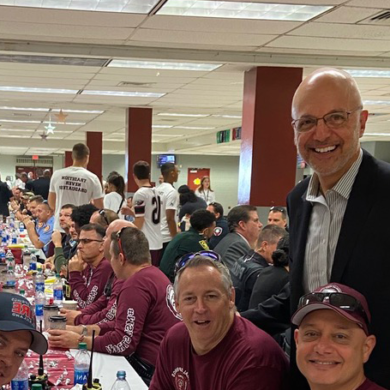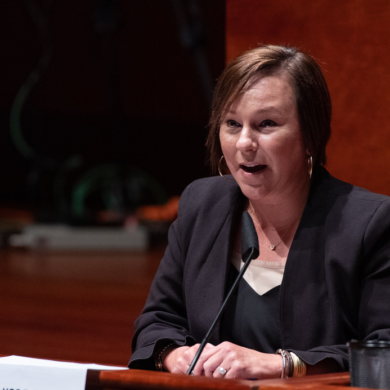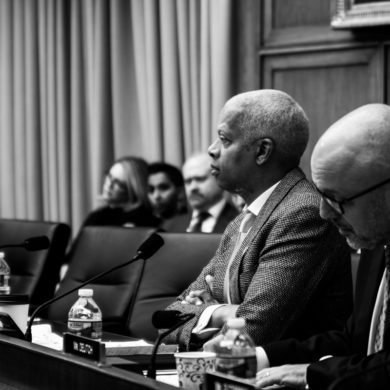Published Date: 05-15-20
By Ruth Vitale
Senator Thom Tillis, of North Carolina, is Chairman of the Senate Judiciary Subcommittee on Intellectual Property. His office began 2020 by announcing a year-long series of hearings to assess the Digital Millennium Copyright Act, 22 years after its passage.
RUTH VITALE: Senator Tillis, thank you so much for agreeing to be interviewed. How did you come to be interested in intellectual property and copyright policy?
SENATOR THOM TILLIS: First, let me say how much I appreciate this opportunity to discuss intellectual property policy and its importance to individual creators and the broader American creative economy. Groups like CreativeFuture, that work tirelessly to advocate on behalf of small and individual creators, provide an important voice in Washington. Especially as we attempt to understand the real world impacts intellectual property policy has on individual creators.
America is the global leader in creativity and innovation. And it’s no coincidence that we also are a leader in protecting and promoting intellectual property. IP hits close to home for me too, because the state of North Carolina makes major contributions to the American innovation economy. North Carolina is an important driver of the biological and pharmaceutical industries, as well as other forms of technological innovation, and plays a key role in the creative industry, including publishing and music. And without the protection afforded by intellectual property – whether patents or copyrights or trademarks – individuals and businesses can’t afford to invest the significant time and money needed to cure the next deadly disease, write the next Great American Novel, produce the next classic film, or develop the next revolutionary product.
RV: You represent the people of North Carolina. As Chair of the IP Subcommittee, can you explain to everyday North Carolinians why copyright is important to America? How is copyright particularly important for your constituents?
TT: That is an excellent question. Copyrights are incredibly important for all Americans – of course to the people of North Carolina, but also to the constituents of every one of my colleagues. The Supreme Court has referred to copyright law as the “engine of free expression.” Copyright law drives creativity, it gives creators an economic incentive to pour their life into making something of cultural value. Copyright law enables writers and musicians and actors and so many other types of creators to channel their creativity energy into a livelihood. And we the people benefit from that. When you watch a movie or become engrossed in a song or disappear into a book, that happens because someone was inspired to take their idea and find a way to creatively express it. The opposite is true when people pirate copyrighted works: they are stealing from our own cultural progress.
RV: We understand that you are working to write legislation that would close the loophole in the law that makes streaming piracy a simple misdemeanor and not a felony, as downloading is. Can you tell us why this is important? And that doesn’t mean that you’re going to arrest grandmothers for watching a UFC fight on Facebook, does it?
TT: Well, I’m not going to be arresting anyone. My goal with this legislation is to provide the Department of Justice with the authority to charge commercial enterprises that are streaming certain types of works with felony copyright infringement. Copyright law already does this for criminal infringement of the reproduction and distribution rights – but only misdemeanor charges for criminal infringement of the public performance right, which covers streaming where there is no download. This is about patching a loophole that makes it easier for criminal commercial enterprises to steal from our hardworking and innovative American creators while at the same time posing a variety of risks to American consumers who may not realize that they are streaming pirated content. To close this loophole, I’m working to develop consensus-driven legislation that can receive broad bipartisan and bicameral support.
RV: Your office began 2020 by announcing a year-long series of hearings to assess the Digital Millennium Copyright Act, 22 years after its passage. Why do you want to address this piece of legislation at this moment in history? What parts of the law do you think need updating?
TT: When Congress passed the DMCA in 1998, it was an incredibly forward-looking piece of legislation, and it has served an important purpose by creating more cooperation between copyright owners and online service providers while also fueling the early expansion of the internet. But much has changed during the past 22 years, and the DMCA’s wear and tear has begun to show. I launched this review with an understanding that some aspects of the DMCA need to be updated to restore the balance of interests that Congress intended when it enacted the law in 1998. But I did not come in with certainties about which parts of the DMCA most need congressional attention. That’s a key component of the eight DMCA-related hearings we scheduled for 2020: I’m asking the experts – both those who have studied these issues and those who live the DMCA every day – to help us identify where Congress should focus DMCA reform.
RV: What have you learned so far from the hearings and your preparation for them?
TT: We had just gotten started when the coronavirus pandemic hit. That forced us to push the DMCA hearing schedule out a little but I believe it has also highlighted the value of strong intellectual property protections. Millions of Americans are helping to stop the spread of coronavirus by remaining at home. I haven’t seen any specific studies, but I’d imagine a large percent of those people have spent quite a bit of time watching movies or binging TV shows with their family.
At the hearings in February and March, I learned a great deal about what Congress intended to do with the DMCA in 1998, about how courts have applied the law in ways that have been consistent – and often times not consistent – with congressional intent, and I learned about the variety of approaches that other countries have adopted to combat online piracy. I also learned about how piracy is affecting creators, like the film producer Jonathan Yunger, who testified about the difficult business decisions he had to make because of copyright infringement and about the American jobs lost to piracy. This is a complicated issue, and the more the Subcommittee can learn about what has worked and what hasn’t, and about alternatives that may be more effective, the better off we’ll be in crafting reform legislation.
RV: Often times, Silicon Valley and Hollywood are on opposite sides of the policy debates around copyright. Do you see areas of compromise where you would encourage the two sides to cooperate and work toward solutions outside of legislation?
TT: I think that there are a lot of areas where tech and entertainment have shared interests, and in some of these areas they already are working together. One example is the voluntary measures that have been adopted as non-legislative supplements to the DMCA, where copyright owners and online service providers have worked together to adopt initiatives that help curb online piracy. I’m encouraged by this and hope both groups will continue to identify areas where they can find common ground. It’s especially important with the speed of technological change these days and the development of new business models. Often times, Silicon Valley and Hollywood both move a whole lot faster than Washington!
RV: What’s your favorite movie? And, what’s on your list of television shows you want to watch?
TT: You mean besides all the movies you’ve produced, Ruth? You know I love Dirty Dancing, really anything that you’ve made.
But in all seriousness, I love so many movies that it’s like asking me who is my favorite child. But the three most likely movies I will watch when I am channel surfing and I stumble upon them are: (1) The Shawshank Redemption; (2) Braveheart; and (3) um, Grease. Of course, now I feel like I’ve hurt Deadpool’s, Inglourious Basterds’, and Amadeus’ and countless other sci-fi movies’ feelings.
As for TV shows/series, I’ve pretty much burned up the current internet inventory. Looking forward to another season of: (1) Ozark (2020); (2) Westworld (2020); and (3) Black Mirror (hoping for another season).
And I really do not think there is anything left to do with Tiger King – watched it. “Liked” it. Not proud.
RV: What’s the best book you’ve read recently?
TT: Older book I read recently: Devil in the White City. Creepy and educational. Currently reading Lincoln’s Greatest Speech.
RV: What’s the song you will play on a jukebox the first time you can go back to a restaurant or bar again?
TT: Bob Marley – Three Little Birds. Followed by a whole lot of up-tempo anything old or new.



